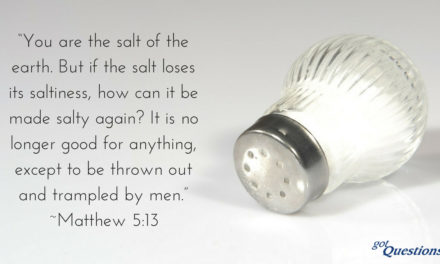Faithful Gospel ministry brings both opposition and blessings. Oppositions to the Gospel even today must not be strange to us as believers especially when we think about what Jesus, our Lord and Saviour, the revelation of God went through. Opposition comes to distract, delude, and deter us from experiencing God’s plan and vision for us as individual believers and as a church. We see today homes and churches shattered on the rocks of delusion and despair, ‘a skyrocketing divorce rate, abuse in the home, disease, crime, abortion, gangs, suicide, incest, child abuse, rape, drive-by shootings, drugs, and the inability of government to handle our problems because we are a people who seek man-made solutions and ignore the biblical mandates of Scripture.’ Jesus’ conflict with the religious people was based on the fact that as experts in the Old Testament Scriptures, the religious experts missed the central truth of God’s Word. The motivation behind Pharisees’ question to Jesus was a matter of human fallenness, contention and constantly under debate, “Which is the first commandment of all?” (Mk 12:28).
John Calvin in capturing the essence of human fallenness wrote, “Man is a fabricum idolarum,” meaning “makers of idols.” Any distortion including the sin of theological error from the true character of God is an act of idolatry. Our errors are rooted in our pride and our slothfulness, hence our practice and understanding of theology, philosophy, love, and wealth may easily become idolatrous. God commands us to love Him, and as diligent disciples, listening, hearing and meditating on His word day and night. The problem is that, Satan controls our disobedient and fallen nature to prefer the lifeless and worthless idols to the real God, hence we make our own idols. The reflection is that, ‘what we make, we own; and what we own, we can control. We did not make God. We cannot control Him. That makes us uncomfortable.’ Beloved, Satan is not relenting but becoming more aggressive controlling our disobedience and fallen nature to promote idolatry of theology, love, sex, power, wealth and many more.
Jesus’ insightful answers to the religious expert points us to the ultimate goal and the impact God wants His Word to have in our lives and those to whom we minister. Jesus’ answer becomes both a compass and a barometer in our study of the Word and in the ministry of building others in the Lord. It directs and helps us to gauge our own condition and that of others we teach or lead as we progress together in our walk with God. Jesus answered, “The first of all the commandments is: ‘Listen, O Israel, the Lord our God is one. Love the Lord your God with your whole heart, with your whole soul, with your whole mind, and with your whole strength.’ And the second, like it, ‘Love your neighbour as yourself.’
Jesus’ word quoted from the Old Testament and known as ‘Shema’ is not just a call to worship by Jews today, it tells the fundamental essential belief of Christian faith, including the importance of first loving and obeying God. Biblical love is based on having right values, hence God’s love, Perfect love is the measuring cup of our true spiritual condition and the level of our maturity. Jesus’ call to the religious experts to ‘listen’ resonates with us today, to listen, to hear because faith comes by hearing and hearing with obedience to God’s Word. God is one. His love is one (Jn 3:16). The ignorance and pride of the religious leaders apply to us today in our lack of the central truth of the Word of God. Living in obedience to God’s Word means living by the standard of love—love for God and for people. The missional outcome of our obedience to God’s Word is love and any practice that is not the product of love for God and others is futile because it is an act of self love.
The love we feel for our families and friends are good but if care is not taking, it may become self love and candidate for idolatry in contemporary culture. There are examples of person following their beloved friends or children away from Christian faith and standard under the disguise of love. Like any created good, loved one can become idols if our affection for them displaced a primary love for God. C. S. Lewis. Lewis in one of his letters said, “When I have learnt to love God better than my earthly dearest, I shall love my earthly dearest better than I do now. In so far as I learn to love my earthly dearest at the expense of God and instead of God, I shall be moving towards the state in which I shall not love my earthly dearest at all. When first things are put first, second things are not suppressed but increased” When our love for others diminishes and undermines our obedience to God’s commandments, we displaces a primary love for God and it ends in our great peril and divisions. Loving God first enhances and missionally orders our love for created goods.
Jesus’ answer in relation to the two commands, “Love the Lord your God with your whole heart, with your whole soul, with your whole mind, and with your whole strength.’ ‘Love your neighbour as yourself,” points to the principle of Substance and summary, the Control that defines and directs other expression of love for others. Love for others can only grow out of the soil of love for God as it is fed and watered by fellowship with God in the streams of the Word, The emphasis is about the necessity of a heart relationship with God through obedience to His Word (Ps 1:2). Without obedience to God Word, expression of love may end up with a life that is artificial, petty, lifeless, critical, submitting to please people or to avoid confrontation. Without fellowship with God, our actions of love, if we have any, will be full of hypocrisy, divisive, and self-centred goals (Rom. 12:9).
The question for our personal and corporate reflection is that, we can ask the same question: what’s most important? How does that question impact our prayer life, our family life, our social life? What one principle or character trait tells others we are followers of Christ? What is the highest value of our culture? How does that single value arrange other values? Our love for God is different from any other love. John Wesley explained that, the human soul is “athirst for God, the living God” and this desire can never by filled with other loves. Charles Wesley in one of his hymns, “Love Divine, All Loves Excelling” concentrates our attention on the perfect love of God as expressed in the missions of the Son and the Holy Spirit for our redemption. The plea for Jesus to visit us with salvation is rooted in his identity as “pure, unbounded love.” According to Doug Koskela, Charles Wesley’s usage of the “‘invocation of the loving Spirit to enter every troubled breast, to take away our bent to sinning, is ordered to a specific end: to “set our hearts at liberty.” Such freedom comes by fulfilling the purpose for which we were created, to pray and praise God without ceasing, to “glory in” His perfect love. A soul set free by such a complete love has no need to look elsewhere for something or someone to complete it. And just for that reason, that soul can now truly will the good of—that is, truly love—its earthly dearest. The intense affection for a loved one, driven by need, is now healed and transformed. In its place arises living water from the fountain of divine love.’
Many ideas about love today are more idolatrous than we realize or think. It is the sinful inclination of our hearts that perverts love into something selfish, unholy, twisted, and ugly. Love is devotion and action. True devotion always leads to action – (Jn 3:18). It is only a right relationship with God that enables and prepares us to love another person rightly and in submission to God, perfectly to save.











Recent Comments